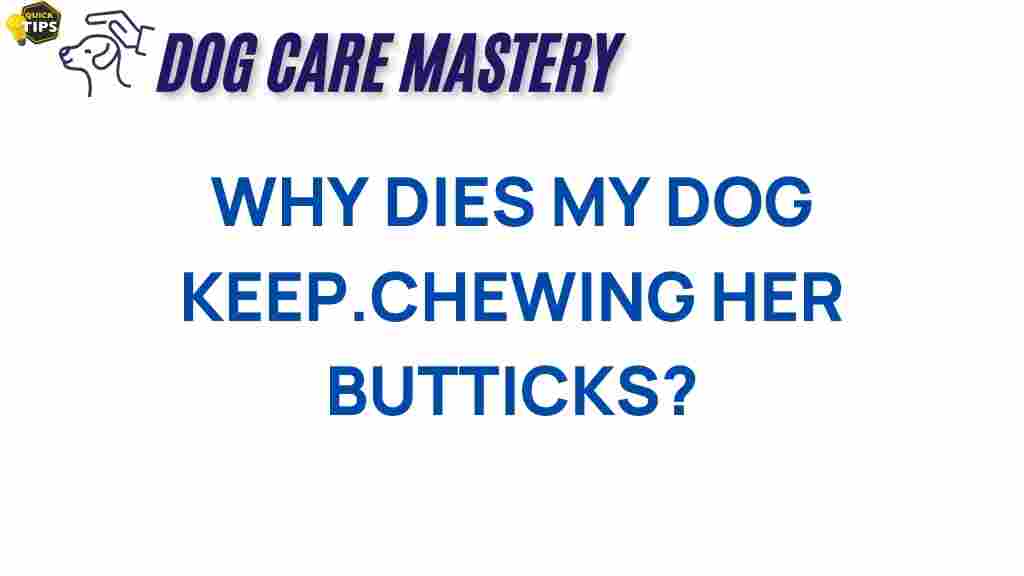Why Does My Dog Keep Chewing Her Butt? Understanding Dog Behavior
As a dog owner, you might have noticed your furry friend engaging in some puzzling behaviors, and one of the most common is butt chewing. While this behavior may seem funny or harmless, it can indicate underlying issues that need attention. Understanding dog behavior is crucial in addressing this concern effectively. In this article, we will explore the reasons behind this behavior, how to address it, and when to seek professional help.
Common Reasons for Butt Chewing
Butt chewing in dogs can stem from various causes, ranging from simple grooming habits to more serious medical conditions. Here are some common reasons your dog may be engaging in this behavior:
- Allergies: Dogs may chew their butts due to allergies, which can cause itching and discomfort. Allergies can be environmental (like pollen), food-related, or due to flea bites.
- Parasites: Fleas, ticks, and worms can irritate your dog’s skin and lead to butt chewing as they try to relieve the discomfort.
- Infections: Bacterial or yeast infections in the anal area can cause itching and discomfort, prompting your dog to chew.
- Anal Gland Issues: Dogs have anal glands that can become impacted, leading to discomfort and resulting in chewing behavior.
- Behavioral Issues: Sometimes, butt chewing can be a sign of anxiety, boredom, or stress, which can manifest in repetitive behaviors.
Step-by-Step Process to Address Butt Chewing
If you notice your dog chewing her butt, it’s essential to take a systematic approach to understand and address the behavior:
1. Observe and Assess
Start by observing your dog’s behavior closely. Take note of:
- How often she chews her butt.
- The duration of the chewing sessions.
- Any accompanying signs, such as redness, swelling, or discharge.
This information can help you determine whether the behavior is habitual or linked to a specific issue.
2. Check for Physical Issues
Examine your dog’s rear end for any signs of irritation, swelling, or unusual odors. If you notice any abnormalities, consult your veterinarian for a thorough examination.
3. Address Potential Allergies
Consider whether your dog may be suffering from allergies. If you suspect food allergies, try switching to a hypoallergenic diet. For environmental allergies, keep your dog’s living area clean and free from allergens.
4. Treat Parasites
Ensure your dog is up-to-date on flea and tick prevention. Regular deworming can also help eliminate internal parasites that may be causing discomfort.
5. Maintain Anal Gland Health
If you suspect anal gland issues, consult your vet. They can manually express the glands and provide advice on how to maintain their health.
6. Provide Mental and Physical Stimulation
Sometimes, boredom can lead to repetitive behaviors like butt chewing. Ensure your dog has plenty of toys, regular exercise, and interactive playtime to keep her engaged.
Troubleshooting Tips for Persistent Chewing
If your dog continues to chew her butt despite your best efforts, consider these troubleshooting tips:
- Change in Diet: Introduce a high-quality diet rich in omega fatty acids to help improve skin health and reduce inflammation.
- Environmental Changes: Minimize stressors in your dog’s environment, such as loud noises or changes in routine.
- Use of Deterrents: Applying a bitter-tasting deterrent on the affected area can discourage chewing.
- Consult a Trainer: If behavioral issues persist, seek the help of a professional dog trainer or behaviorist.
When to Seek Professional Help
While some instances of butt chewing can be resolved at home, there are times when it’s crucial to seek professional help:
- If the chewing is excessive or causing injury.
- If you notice persistent signs of infection or discomfort.
- If your dog’s behavior changes suddenly.
- If at-home remedies do not yield results.
In such cases, your veterinarian can provide a comprehensive evaluation and recommend appropriate treatments.
Conclusion
Understanding your dog’s behavior is essential for maintaining her health and happiness. If your dog keeps chewing her butt, it’s important to assess the situation carefully and address any underlying issues. From allergies to behavioral concerns, there are various reasons for this behavior, and with the right approach, you can help your furry friend find relief. Remember, when in doubt, don’t hesitate to reach out to your veterinarian for guidance.
For more information on dog behavior and health tips, check out this comprehensive guide on dog care and learn how to keep your pet happy and healthy!
For external resources, you can visit the American Kennel Club’s website, which offers valuable insights into canine behavior and health.
This article is in the category Behavior and created by dogcaremastery Team
